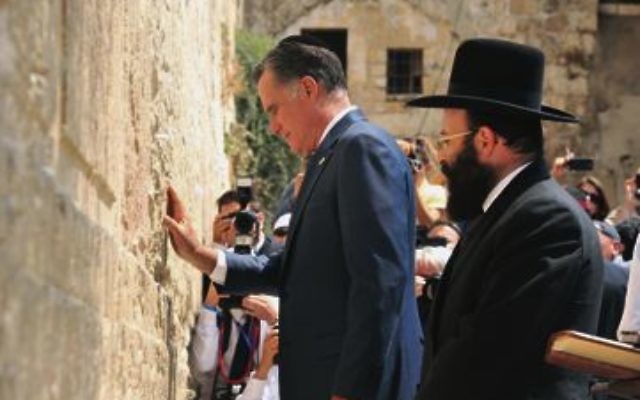Romney: Jerusalem is Israel’s capital
JERUSALEM – With Israelis furious about two high-profile refusals to recognise Jerusalem as their country’s capital, Mitt Romney said exactly what they wanted to hear during his visit this week.
Romney, the Republican candidate in America’s November presidential election, arrived in Israel for a 36-hour visit late on Saturday. He came just two days after White House spokesperson Jay Carney refused to reiterate America’s official position that Jerusalem is Israel’s capital when questioned on the issue in a briefing. And he came less than a fortnight after the BBC published its online guide to the Olympics pointedly omitting Israel’s capital.
But Romney made a point of standing up against the BBC, Carney, and the rest of the international community, which refuse to call Jerusalem the capital because the city includes land captured by Israel in 1967. “It is a deeply moving experience to be in Jerusalem, the capital of Israel,” he said on Sunday at a sunset policy address in a dramatic courtyard overlooking the walls of Jerusalem’s Old City. Then, just over an hour later, before sitting down to dinner at the home of Prime Minister Benjamin Netanyahu, he said: “It’s always an inspiring and moving experience to be in Jerusalem, the capital of Israel.” If he is elected president he will move the US embassy from Tel Aviv to Jerusalem, he claimed.
Romney also tackled issues that Israelis view with more life-and-death importance. One of his top foreign policy advisers, Dan Senor, told reporters that while the West should do everything it can to stop Iran acquiring nuclear weapons, “if Israel has to take action on its own in order to stop Iran from developing that capability, the Governor would respect that decision”. Romney himself said in relation to Iran: “We have seen the horrors of history. We will not stand by. We will not watch them play out again.”
He made this comment at a policy address to an applauding crowd of around 300 Republican-supporting Americans who have moved to Israel. In his view, when Iranian leaders deny the Holocaust and talk of destroying Israel, “only the naive – or worse – will dismiss it as an excess of rhetoric”. He said: “Make no mistake: the Ayatollahs in Tehran are testing our moral defences. They want to know who will object, and who will look the other way.
“My message to the people of Israel and the leaders of Iran is one and the same: I will not look away; and neither will my country.”
Romney went on to claim that those who take a hard line on Iran are “the true peacemakers”, saying: “It is sometimes said that those who are the most committed to stopping the Iranian regime from securing nuclear weapons are reckless and provocative and inviting war. The opposite is true.”
During Romney’s trip, which was sandwiched between visits to London and Poland, he held a series of meetings with political figures including President Shimon Peres, Netanyahu and Opposition Leader Shaul Mofaz. He also visited the Western Wall and held an intimate breakfast at Jerusalem’s King David Hotel for 40 donors to his campaign, mostly US expats, who paid US$50,000 per couple. Guests included casino billionaire Sheldon Adelson, one of the Romney campaign’s most generous donors and owner of the Israeli newspaper Israel HaYom.
On the Palestinian side, Romney met Palestinian Prime Minister Salam Fayyad, but in what many in Ramallah saw as a snub, he did not meet Palestinian President Mahmoud Abbas. He also angered Palestinians with his comments about Jerusalem’s status. “He talked about Jerusalem as the capital of Israel, referring to [both West and] East Jerusalem, which is occupied territory and should be the capital of a future Palestinian state,” Ashraf Khatib, spokesperson for the Palestinian negotiating team, said in an interview with The AJN.
Palestinians also objected to Romney’s suggestion that the economic gap between Israel and the Palestinians came about in part because Jewish culture breeds prosperity. Chief Palestinian negotiator Saeb Erekat described the comment as “racist”.
In contrast to the negative Palestinian reaction, Romney’s positions struck a chord with Israeli leaders. Netanyahu, who worked at a US consulting firm with Romney in the 1970s, praised his perspective on Iran. “Mitt, I couldn’t agree with you more, and I think it’s important to do everything in our power to prevent the Ayatollahs from possessing the capability,” he said. “We have to be honest and say that all the sanctions and diplomacy so far have not set back the Iranian program by one iota. And that’s why I believe that we need a strong and credible military threat, coupled with the sanctions, to have a chance to change that situation.”
But despite the common ground between Romney’s position on Iran and that of Netanyahu, the Israeli leader was careful not to say anything that could be construed as endorsing him in the election race against President Barack Obama, who Netanyahu is known to deem overly patient towards Iran. Other Israeli politicians took the same approach.
“The important thing is the fact that people think it’s important to visit Israel as part of their election campaign,” Einat Wilf, Atzmaut (Independence) Knesset member told The AJN. She said that the candidates’ Israel focus is good for the country because it gives its issues more prominence, adding that it raises no problems because politicians in both countries understand that there is no endorsement implied.
NATHAN JEFFAY


comments